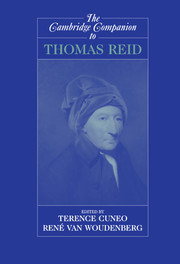Book contents
- Frontmatter
- Introduction
- 1 Reid in Context
- 2 Thomas Reid and the Culture of Science
- 3 Reid on Common Sense
- 4 Reid’s Theory of Perception
- 5 Reid’s Reply to the Skeptic
- 6 Nativism and the Nature of Thought in Reid’s Account of Our Knowledge of the External World
- 7 Reid and the Social Operations of Mind
- 8 Reid on Memory and the Identity of Persons
- 9 Thomas Reid’s Theory of Freedom and Responsibility
- 10 Reid’s Moral Philosophy
- 11 Reid’s Philosophy of Art
- 12 Reid’s Philosophy of Religion
- 13 Reid’s Influence in Britain, Germany, France, and America
- Bibliography
- Index
9 - Thomas Reid’s Theory of Freedom and Responsibility
Published online by Cambridge University Press: 28 May 2006
- Frontmatter
- Introduction
- 1 Reid in Context
- 2 Thomas Reid and the Culture of Science
- 3 Reid on Common Sense
- 4 Reid’s Theory of Perception
- 5 Reid’s Reply to the Skeptic
- 6 Nativism and the Nature of Thought in Reid’s Account of Our Knowledge of the External World
- 7 Reid and the Social Operations of Mind
- 8 Reid on Memory and the Identity of Persons
- 9 Thomas Reid’s Theory of Freedom and Responsibility
- 10 Reid’s Moral Philosophy
- 11 Reid’s Philosophy of Art
- 12 Reid’s Philosophy of Religion
- 13 Reid’s Influence in Britain, Germany, France, and America
- Bibliography
- Index
Summary
It is fitting that one of the last pieces of philosophical writing to come from Reid's hand should bear the title “Of Power.” For the concept “power” lies at the foundation of Reid's account of agent-causation, which in turn is the central idea in his account of human freedom and responsibility. In this final piece of philosophizing on this subject, Reid begins by pointing out that: “Every voluntary exertion to produce an event implies a conception of the event, and some belief or hope that the exertion will be followed by it” (OP: 3). Accordingly, our willing (deciding) to take a walk in the woods implies our having a conception of our taking a walk in the woods and some belief or hope that an exertion of ours intended to bring that about will be followed by our taking a walk in the woods. Reid takes this claim of his to imply that a conception of power is antecedent to every deliberate act.
Does he think that the earliest exertions by an infant involve a conception of power? No. Reid thinks that our earliest exertions are instinctive, unaccompanied by a conception of some goal to be accomplished. It is only when experience teaches us that certain exertions are followed by certain events that we learn to make these exertions voluntarily and deliberately in order to produce such an event. And once we believe that the event depends upon our exertion, we then have “the conception of power in ourselves to produce the event” (ibid.). Reid therefore concludes that our conception of power “is the fruit of experience and not innate” (ibid.).
- Type
- Chapter
- Information
- The Cambridge Companion to Thomas Reid , pp. 222 - 242Publisher: Cambridge University PressPrint publication year: 2004
- 1
- Cited by

